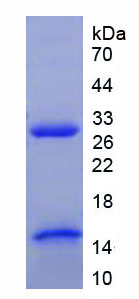Recombinant Tissue Factor (TF) 

CD142; FIII; F3; TFA; Thromboplastin; Coagulation Factor III
Overview
Properties
- Product No.RPA524Mu01
- Organism SpeciesMus musculus (Mouse) Same name, Different species.
-
Applications
Positive Control; Immunogen; SDS-PAGE; WB.
If bio-activity of the protein is needed, please check active protein.
Research use only - DownloadInstruction Manual
- CategoryHematologyCardiovascular biology
- Source Prokaryotic expression, Host E.coli
- Endotoxin Level<1.0EU per 1µg (determined by the LAL method)
- Subcellular LocationMembrane
- Molecular Mass 26.6kDa, Accurate 31/15kDa(Analysis of differences refer to the manual)
- Residues & TagsGly30~Glu251 with N-terminal His Tag
- Buffer FormulationPBS, pH7.4, containing 0.01% SKL, 1mM DTT, 5% Trehalose and Proclin300.
- Traits Freeze-dried powder, Purity > 90%
- Isoelectric Point7.7
Share your citation
Upload your experimental result
Review
Leave a message
Loading...
Sign into your account
Share a new citation as an author
Upload your experimental result
Review
Please attach serial No. on instruction manual


Contact us
Please fill in the blank.
Name*
Organization
Address
E-mail address*
Telephone
Inquiry*
Verification code*

Sequence

Usage
Reconstitute in 10mM PBS (pH7.4) to a concentration of 0.1-1.0 mg/mL. Do not vortex.
Storage
Avoid repeated freeze/thaw cycles. Store at 2-8°C for one month. Aliquot and store at -80°C for 12 months.
Stability
The thermal stability is described by the loss rate. The loss rate was determined by accelerated thermal degradation test, that is, incubate the protein at 37°C for 48h, and no obvious degradation and precipitation were observed. The loss rate is less than 5% within the expiration date under appropriate storage condition.
Increment services
-
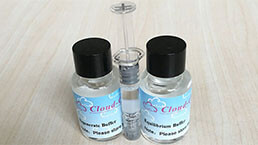 Endotoxin Removal Kit
Endotoxin Removal Kit
-
 BCA Protein Quantification Kit
BCA Protein Quantification Kit
-
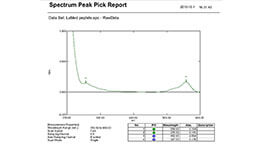 Protein Labeling Customized Service
Protein Labeling Customized Service
-
 Molecular Mass Marker for Protein
Molecular Mass Marker for Protein
-
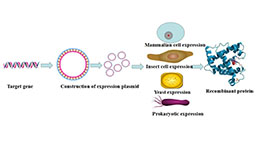 Recombinant Protein Customized Service
Recombinant Protein Customized Service
-
 Monoclonal Antibody Customized Service
Monoclonal Antibody Customized Service
-
 Polyclonal Antibody Customized Service
Polyclonal Antibody Customized Service
-
 Protein Activity Test Experiment Service
Protein Activity Test Experiment Service
-
 Immunoprecipitation (IP) Experiment Service
Immunoprecipitation (IP) Experiment Service
-
 Buffer
Buffer
-
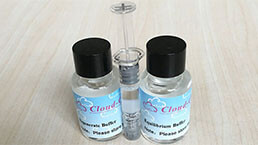 Endotoxin Removal Kit II
Endotoxin Removal Kit II
-
 Real Time PCR Experimental Service
Real Time PCR Experimental Service
-
 Spike RBD Protein (S-RBD)
Spike RBD Protein (S-RBD)
-
 Protein G
Protein G
-
 Protein A
Protein A
Citations
- Calcitonin gene-related peptide-mediated antihypertensive and anti-platelet effects by rutaecarpine in spontaneously hypertensive ratsPubMed: 18625276
- Increased plasma level of asymmetric dimethylarginine in hypertensive rats facilitates platelet aggregation: role of plasma tissue factorNrcresearchpress: y10-115
- Ruscogenin attenuates monocrotaline-induced pulmonary hypertension in ratsPubmed: 23538027
- Endothelial gene expression and molecular changes in response to radiosurgery in in vitro and in vivo models of cerebral arteriovenous malformationsPubmed: 24199192
- Sphingolipid Pathway Regulates Innate Immune Responses at the Fetomaternal Interface during PregnancyPubmed:25505239
- Thrombosis in Hemodialysis Patients; Their Association with Tissue Factor and Tissue Factor Pathway InhibitorPubMed: 20011089
- Noble-Collip Drum Trauma Induces Disseminated Intravascular Coagulation But Not Acute Coagulopathy of Trauma-ShockPubMed: 25423126
- Ex vivo simulation of cardiopulmonary bypass with human blood for hemocompatibility testingPubMed: 26243277
- Trans‐fatty acid promotes thrombus formation in mice by aggravating antithrombogenic endothelial functions via Toll‐like receptorsPubMed: 25546502
- The effects of polysaccharides from the root of Angelica sinensis on tumor growth and iron metabolism in H22-bearing micePubmed:26757699
- Nebulized Heparin Attenuates Pulmonary Coagulopathy and Inflammation through Alveolar Macrophages in a Rat Model of Acute Lung Injurypubmed:29202212
- Nebulized anti-coagulants as a therapy for acute lung injury and acute respiratory distress syndromePubmed: 29202212
- Effects of nebulized antithrombin and heparin on inflammatory and coagulation alterations in an acute lung injury model in ratsPubmed: 31755229
- Amelioration of Coagulation Disorders and Inflammation by Hydrogen-Rich Solution Reduces Intestinal Ischemia/Reperfusion Injury in Rats through NF-κB …Pubmed: 32587471
- Effect of Glucocorticoid Administration in Intravenous Pulses on Selected Parameters of the Coagulation SystemPubmed:35685509






